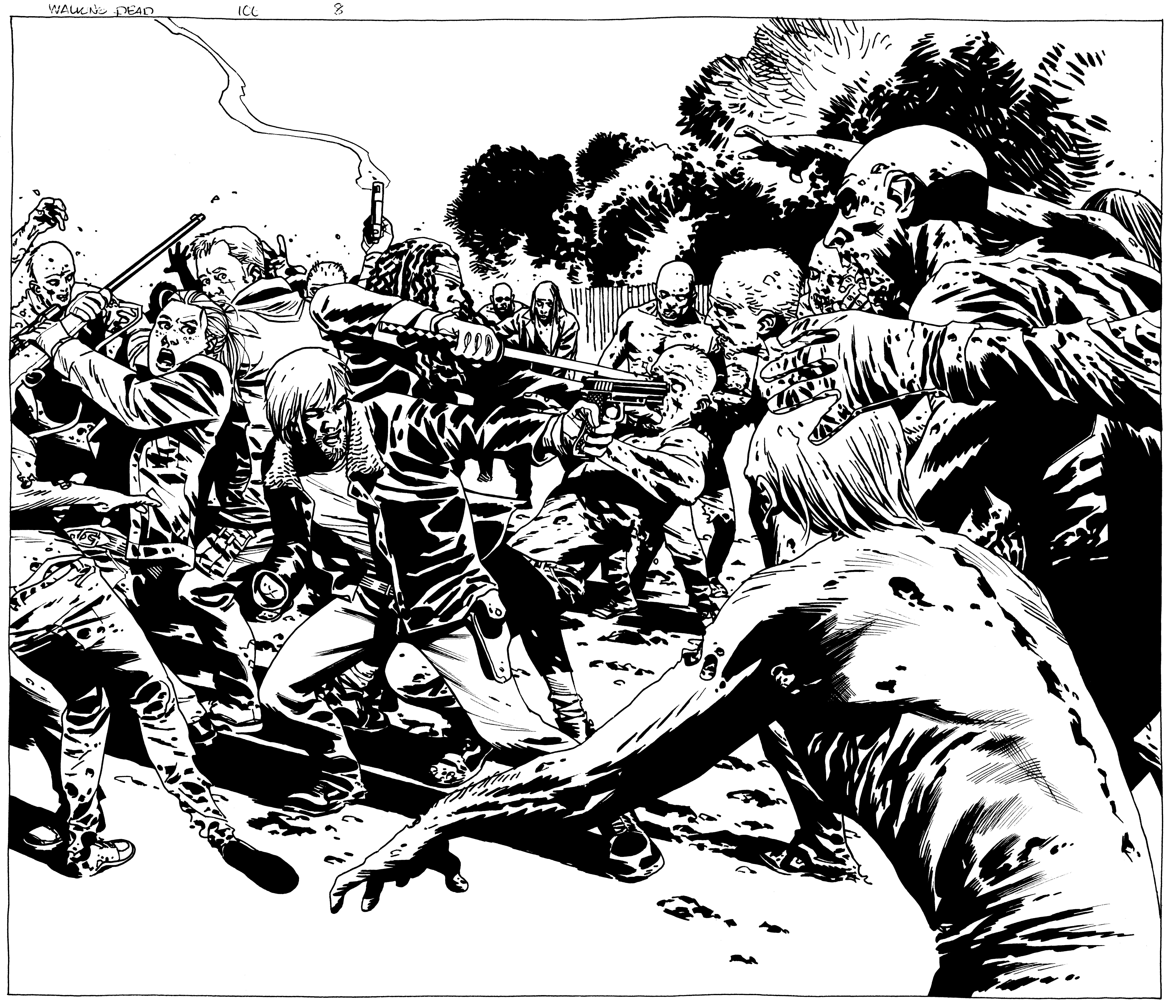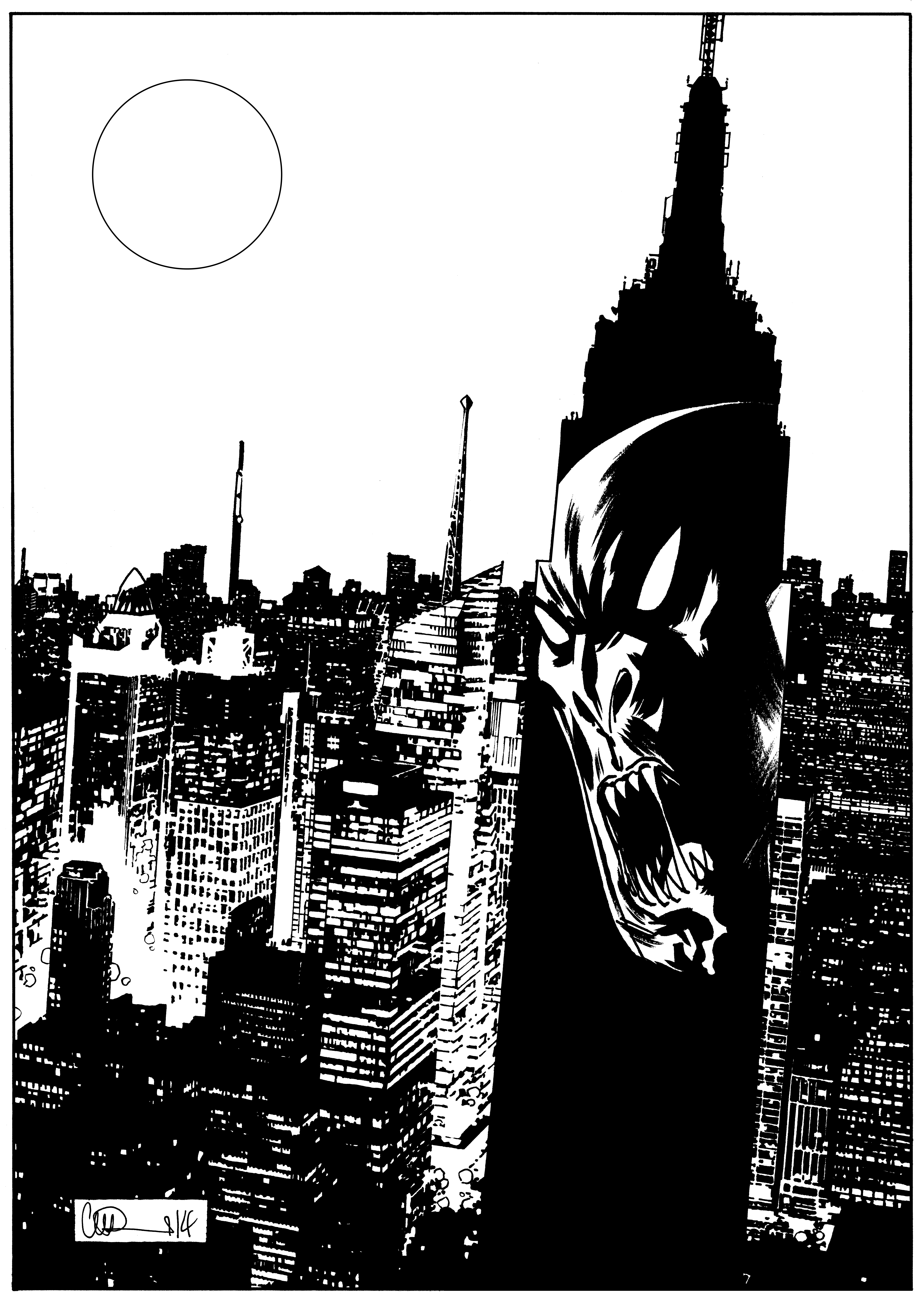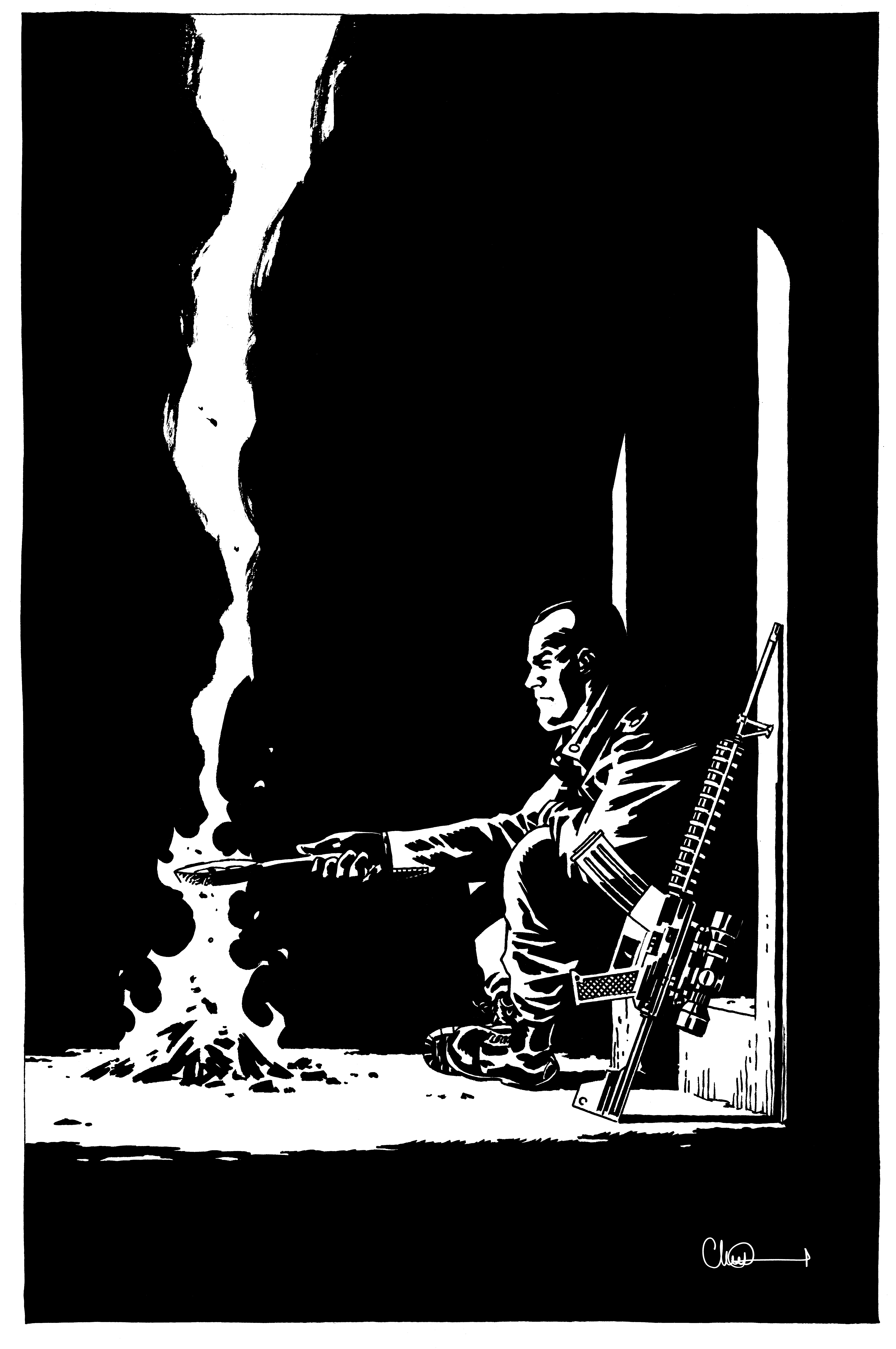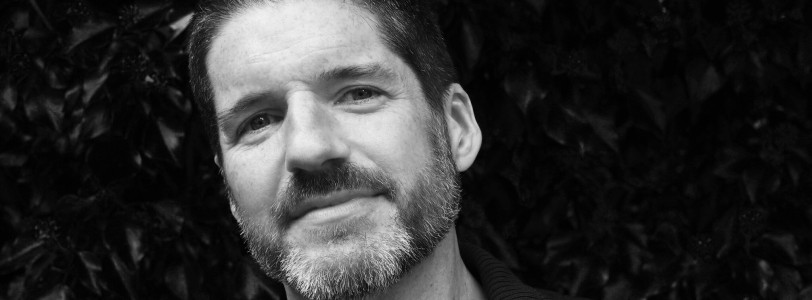Could you first introduce yourself to the reader?
My name is Charlie Adlard and I am a cartoonist.
Is that how you describe yourself, a cartoonist?
Whether you do what I do, or whether it’s something like Shultz, with peanuts, we all caricature to different levels, I believe we’re all cartoonists. A spade’s a spade.
What does your job involve? Give us the typical outline of a day, if there is one?
I’m very much a guy who’s quite comfortable in routine so actually I do have a regular day, it’s just a 9-to-5 day that people do with normal jobs. Basically the kids go to school, I come home, I get to work, kids get back from school. I might have to stop when they get straight back from school, but usually around the 5:30pm - 6pm time I will stop.
So what are you doing in that time?
If I’m working on a book, for example The Walking Dead, it’s a monthly book so I have 22 pages to draw plus a cover, so I basically have to divide my time into working out how many pages I can do a day, factoring in various things such as holidays or other appointments, and making sure I can do the work in the time allotted.
I like to get three pages done a day, that’s generally my goal, and I get frustrated with myself if I don’t achieve that goal - regardless of deadlines.
Will you keep working if you don’t meet that goal?
I do, otherwise I will just be frustrated for the rest of the evening, so I end up sneaking back into the studio, regardless. All of this has benefited my efficiency, it’s just this attitude I have, other people don’t and that’s cool - I wish I didn’t. I kind of admire people that can just drop tools and they know they can catch up. 
What was your career path into this job? Have you also worked outside the industry?
I’ve always drawn comic books since I was around six or seven. My dad bought me a copy of the Mighty World of Marvel in 1972 which was a British reprint of the Marvel comics from the early to mid sixties, and that was the sort of thing that started me off. Then I just drew comic books all the way through school.
I always knew this is what I wanted to do - my only talent is doing what I do, to be honest. When I was at school I was brutally average in academia, and I was terrible at sports so art was the only place I could excel at, and I think my teachers could see that. I remember my teacher at prep school saying “I can’t teach him anymore”, probably because I could draw better than she could, but I never quite knew what she meant...
When I left school obviously there were no courses for comic art. I assumed the natural route was university, so I was looking at art colleges. I did my art foundation at The Tech and then ended up going to Maidstone Arts College to study film and video.
So I did that, and came out with a degree - with no idea what to do with it - so I moved to London. I was trying to find work in the film industry, but I could only get work as a runner, which disillusioned me a bit. I was the drummer in a band, and I tried to make it work for a while, but it eventually fell apart - not in a dramatic way, but the opportunity doors started closing, not opening - so I moved back home. While sitting there thinking “hmm, what am I going to do now?” I thought, “I could try this comic lark”, and as soon as I put pen to paper, I realised that this is what I needed to be doing.
From there, it took me about three years to break into the industry. I spent that time beavering away at home building up my portfolio, as in this line of work you needed to show sequential art, not just individual images. I took my work to conventions and eventually landed a job.
What’s great about your job?
It’s my hobby! I’m basically being paid to do what I love.
I’ve had the odd ‘normal job’ when I was in London, but that’s it. But I’ve had probably no more than three months of my whole life doing what you’d perceive as a normal job, the rest of my life has just been having fun and getting paid for it.
 What do you find most challenging?
What do you find most challenging?
Deadlines are always challenging in a lot of ways, but because of my own weird way of working, when I set my own personal deadlines, I find that more challenging than the actual deadlines themselves.
Sometimes working at home is not the best way of achieving goals. Sometimes there are general disturbances you get at home that you wouldn’t get in an office. People who wouldn’t ring you when you’re in an office are more likely to ring if they know you’re at home.
What are the highlights of your career to date?
The laureate is a real highlight.
Ok, so let’s move onto that. You were announced as the comic laureate in 2016. What does that mean?
As the comic laureate you represent the industry and promote comic books generally as a genuine form of literacy to everyone, but with a main focus on education with teachers and librarians who are able to carry on the message.
What I want to make clear though is that comics aren’t a specific form of reading for kids and people who find it hard to read, or don’t want to read. They are for everyone, and they’re just another form of reading. In France they call it the ninth art, that’s how well it’s regarded.
What is some of the work you have undertaken as your role of laureate?
In addition to presentations and interview panels, the stranger ones were where I had to go and talk to the ‘unconverted’. What I found though was that I had to be weary when I got an invite, and wonder whether they want you to attend on the basis of being the laureate, or if they want you there because of The Walking Dead. I think my predecessor, Dave Gibbons had the same issue - do they want him there because he's laureate, or do they want him there because he drew Watchmen. Am I going to be there to talk about comics, or am I going to be signing books?
The only people you’re talking to in that situation is the converted, so what’s the point? I’m talking about how comics should be literal and everyone is just there agreeing with you anyway.
Do you have any words of advice for Hannah Berry, who has now taken your place?
She doesn’t need advice, she’s an incredibly capable person. She’ll bring a different aspect and personality to the role, and she’s a great speaker - much better than I am! And I hate saying this as it sounds slightly belittling - it’s not meant to be - but she doesn’t have the baggage that Dave and I have from Watchmen and The Walking Dead, so when she’s brought in it will be about her role as the comic laureate.
Hopefully that will make her role a lot more important in certain ways, and she will be able to get out there and talk to people.
Do you think the success of franchises like the Marvel Cinematic Universe, or the The Walking Dead game by Telltale Games, has helped foster new interest in comics?
Everyone thinks that, because of the success of things like the Marvel Cinematic Universe, the comic book industry is just about superheroes, and that’s perpetuated by people buying those comics just because of nostalgia. There is this small base of - typically older - people buying these comics because they have disposable income, and that leads to the regurgitation of the same old things, and children are coming up through that. It’s not helped that the movies are so bloody popular!
But the audiences aren’t then going back to the comic books.
The Walking Dead was a bit of a game changer, but I’ve yet to see something come up behind it be as successful at doing something else. I don't know whether that’s the industry not capitalising on that success, or if it’s people still being of that mindset that they can handle one property that’s not superheroes.
You’ve spoken before about your dislike of the phrase graphic novel. Do you not think it could have use as a means of distinguishing content more aimed at mature audiences, for example Watchmen or Fables?
No, I don’t think that at all. The phrase was coined in the 80s by people wanting to get into the book market. For some reason the book market didn’t like the term comic but they seemed to accept the term graphic novel, and now I think the term has become a byword for pretentiousness, with artists saying they don’t draw comics they draw graphic novels. It just feels like a pointless intellectualisation of what we do.
It sort of goes in parallel with me calling myself a cartoonist as opposed to a comic book artist. Why separate myself from somebody that does the same sort of thing - it’s just this big broad church, and why can’t we call comics comics? We’re all the same.
Have you noticed any changes in the industry? If so, what?
Other than the rise of graphic novels?
As the wider medium of literature has found, people don’t want to read physical things as much as they did 20 or 30 years ago. The comic industry from when I started was selling in the millions, but has since imploded. We suffer the exact same problems that anyone else in the book market does.
I’m talking specifically about the US and UK markets here, to be clear, but I think we’re suffering from the malaise of people not wanting to read anymore. In the UK at least we’ve always had this attitude of comics just being for kids - which is fine, but I want them to be for adults as well, I want comics for everyone. That’s why the comic laureate role was created, to convince people that there is a genuine argument that they’re a genuine form of literacy.
Do you think that attitude is changing?
It is changing something in a country that has been socially engineered to think another way, so it’s one of those things that is so ingrained in society that it is going to take generations to change. You can’t change these things overnight - I can’t come along and suddenly everyone says ‘Oh yeah, let’s start reading comics’. It’s still embarrassing to take out a comic on the tube - or even a graphic novel! - and start reading.
What is one comic franchise you would love to work on, or an author you’d love to work with?
I’m already doing both! I’m working my good friend Robbie Morrison, a writer who also lives locally, and we’re going to be doing a crime thriller - no fancy elements or a specific genre. Hopefully it’s going to be published in France first, as we’d love to a couple of 90+ page books in a hardcover - something they do more over there.
We’ve actually worked together on a few things over the years, but I guess our most ‘famous’ thing was a book called White Death which is almost 20 years old! It was a book set in World War I, set in the border of Italy and Austria, and the title of the book refers to the canons they fired into the mountains to cause avalanches which they termed the white death, and it was about turning nature into a weapon. I actually drew it with charcoal and chalk on grey paper, so it was incredibly different from what I would normally do. I mean it sold bugger all, but it’s still out there!
You’ve been granted the ability to send a message to 16-year-old you. What do you say?
Avoid all of the other stuff you wasted your time with! No, I’m joking, it’s all experience, and you have to experience failure as well as success but I would say forget about that, comics are what you wanted to do, stick to that, son.
Do you have any advice for young people interested in doing your kind of job?
The opportunities out there nowadays are much more - when I was doing it there wasn’t the internet - but I still think your best opportunities still come from physically getting out there, going to meet editors and people in the industry because then they’ll remember you.
Build a portfolio, and make sure there is sequential art. By all means stick in some nice pictures as well, to show you can do other things, but it’s essential to have three or four pages of sequential images. You don’t need much - editors don’t want to spend days reading a proposal, and they don’t want to spend ages going through artwork. Just choose three or four of your best pieces.
If it’s taking you a week per page you’re not going to get paid! At the very least, you should be able to draw a page a day. Obviously when you work you’ll get quicker and quicker as you get used to it.
And be persistent without being annoying. You’ve got to be determined, but you can’t ring someone up everyday.
This interview was edited for brevity and clarity









0 Comments